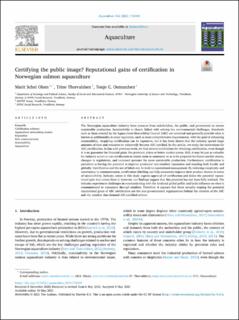| dc.contributor.author | Olsen, Marit Schei | |
| dc.contributor.author | Thorvaldsen, Trine | |
| dc.contributor.author | Osmundsen, Tonje C. | |
| dc.date.accessioned | 2022-06-21T10:43:20Z | |
| dc.date.available | 2022-06-21T10:43:20Z | |
| dc.date.created | 2021-06-15T09:28:30Z | |
| dc.date.issued | 2021 | |
| dc.identifier.citation | Aquaculture. 2021, 542 (736900), 1-11. | en_US |
| dc.identifier.issn | 0044-8486 | |
| dc.identifier.uri | https://hdl.handle.net/11250/2999794 | |
| dc.description.abstract | The Norwegian aquaculture industry faces pressure from stakeholders, the public, and government to ensure sustainable production. Sustainability is closely linked with solving key environmental challenges. Standards such as those created by the Aquaculture Stewardship Council (ASC) are universal and generally provide what is known as additionality to state regulation, such as more comprehensive requirements, with the goal of enhancing sustainability. Acquiring certification can be expensive, but it has been shown that the industry spends large amounts of time and resources to voluntarily become ASC certified. In this article, we study the motivations for ASC certification. In line with previous work, we find several motivations for obtaining certification, even though it is no guarantee for financial gains like premium prices or better market access. Still, it may be just as valuable for industry actors to use certification to create room to maneuver so as to be prepared for future market claims, changes in regulations, and increased pressure for more sustainable production. Furthermore, certification is perceived as having the potential to improve producers' and retailers' reputation and standing both locally and globally. Certification and the use of labels can be tools in reputational management. By reducing complexity and uncertainty in communication, certification labelling can help consumers improve their product choices in terms of sustainability. Industry actors in this study express approval of certification and desire the potential reputational gain that comes from it; however, our findings suggest that this potential has not been fully realized. The industry experiences challenges in communicating with the local and global public and lacks influence on what is communicated to consumers through retailers. Therefore, it appears that those actually reaping the potential reputational gains of ASC certification are the non-governmental organizations behind the creation of the ASC and the retailers that demand ASC-certified salmon. | en_US |
| dc.language.iso | eng | en_US |
| dc.publisher | Elsevier | en_US |
| dc.rights | Navngivelse 4.0 Internasjonal | * |
| dc.rights.uri | http://creativecommons.org/licenses/by/4.0/deed.no | * |
| dc.subject | Aquaculture | en_US |
| dc.subject | Sustainability | en_US |
| dc.subject | Risk communication | en_US |
| dc.subject | Reputation | en_US |
| dc.subject | Aquaculture stewardship council | en_US |
| dc.subject | Certification schemes | en_US |
| dc.title | Certifying the public image? Reputational gains of certification in Norwegian salmon aquaculture | en_US |
| dc.type | Peer reviewed | en_US |
| dc.type | Journal article | en_US |
| dc.description.version | publishedVersion | en_US |
| dc.rights.holder | © 2021 The Authors. Published by Elsevier B.V | en_US |
| dc.source.pagenumber | 1-11 | en_US |
| dc.source.volume | 542 | en_US |
| dc.source.journal | Aquaculture | en_US |
| dc.identifier.doi | 10.1016/j.aquaculture.2021.736900 | |
| dc.identifier.cristin | 1915814 | |
| dc.relation.project | Norges forskningsråd: 295114 | en_US |
| dc.relation.project | Norges forskningsråd: 254841 | en_US |
| dc.relation.project | Norges forskningsråd: 234139 | en_US |
| dc.source.articlenumber | 736900 | en_US |
| cristin.ispublished | true | |
| cristin.fulltext | original | |
| cristin.qualitycode | 2 | |

